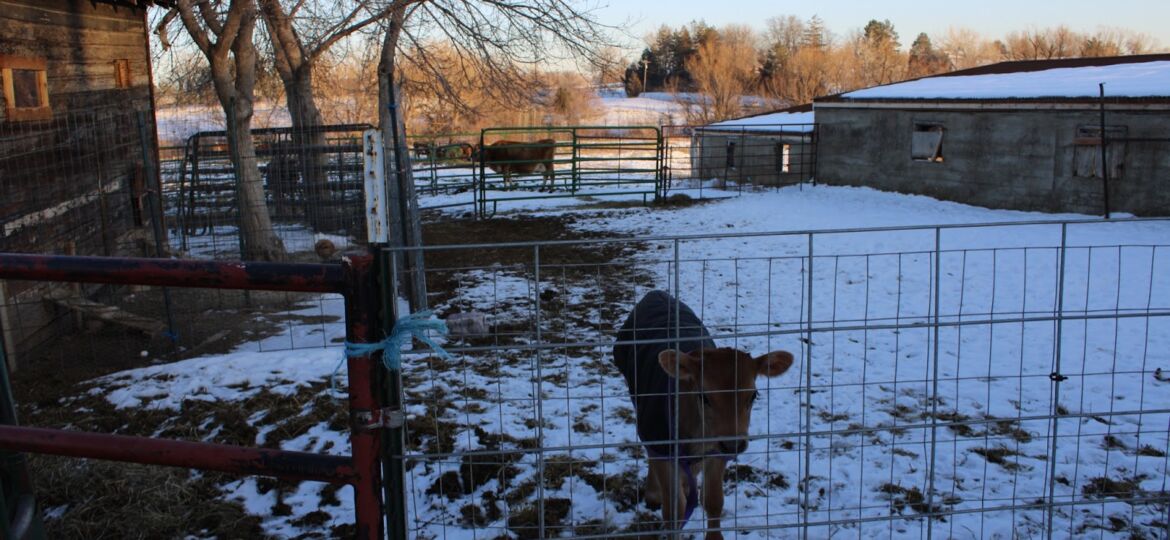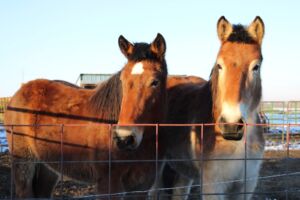
Community farm in Boulder promotes sustainability and mental health through dedication to the land
Light Root Community Farm (Light Root), a draft-powered working farm in Boulder produces dairy products, eggs and vegetables. On top of being a working farm, it is promoting sustainability and mental health through dedication to the land. Light Root also has a non-profit, the Living Earth Agriculture Foundation (LEAF).
“Why would people get into it? Because it is real, it is grounding, it is connecting, you are working with animals, you are outside in the fresh air and sunshine,” Cameron Genter, one of the two farmers at Light Root said. “In a disconnected world, small diversified farming is very real and I think people can feel that.”
Genter runs the farm along with his spouse, Daphne Kingsley. On the farm, they work with their two daughters: Kaia Genter and Miriam Genter; as well as three others: Caitlin Cassidy, Hannah Koeppl and Claire Feeney.
On behalf of LEAF, Genter said, “We work with adults in addiction recovery and we work with an outpatient mental health program. So people come out to the farm for therapy. We are not therapists, but we facilitate them coming here. The farm can be a place of healing.”
“I see the suffering and I feel like this place can offer a small amount of hope or healing or something,” Genter explained. “To remind them that Hey I know it’s crazy out there and it’s even getting a little crazier, but there is this thing called the Earth that is really healing and lets just stop and touch it.’”
Genter shared that working with the land is a way to introduce peace into someone’s life.
“You’re literally interacting with these animals and caring for them and stewarding them,” Genter said. “You’re totally tied into their rhythms and the soil and planting a seed and watering and harvesting, it’s connecting in a different type of way.”

As of 2020, agriculture accounted for an estimated 10-12% of the greenhouse gasses emitted globally by humans. This percentage is highly influenced by industrial agriculture and factory farming.
“There is a lot of negativity nowadays surrounding methane and cow burps– it’s true for factory farming, but it’s not true for cows that actually graze and manage grass,” Genter said.
Compared to industrial farms, small-scale farms tend to consume less energy and emit less greenhouse gasses. With the right practices and knowledge of the land, small-scale farms may have the potential to capture greenhouse gasses.
“A cow on the grass is harmony, a cow in a feed lock is not harmony,” Genter said. “Once you take a cow and put it out of that environment, that’s when things get weird.”
Genter emphasized that a successful farm is one that just facilitates an already natural process. “I know that cows are meant to be on grass and if you do that, it’s not a cow problem, it’s a human problem,” Genter said. “Let’s just manage the cows right and we won’t have to talk about methane.”
Light Root practices sustainability on multiple levels, many of which are only possible due to the small-scaled nature of the farm. The farm is 60-acres, has around 25 cows, 15 of which are milking cows, as well as pigs, chickens and draft horses.
“The farm is fairly self sustainable, we do not bring a lot of outside inputs in,” Genter explained.
“There is a beautiful cycle between animals and plants,” he continued. “Animals have manure and you can make compost out of that, which then goes to fertilize soil, which then grows the plants.”

The farm practices diversified agriculture and crop rotation, which when done long-term, can improve soil condition as well as boost system productivity.
“Animals and plants fit together, the more diversity you have, the more health there is. For our financial stability, but also for the health of the farm,” Genter said, explaining that when something happens to one crop there will be another thing that is going well.
To ensure the health of both the cows and the pasture, Genter uses rotational grazing.
“Rotational grazing, regenerative grazing, mob grazing, there are a lot of different terms for it,” he said. “It’s just the idea to rest the grass and let it grow back before grazing.”
The cows at Light Root could be moved every 12 hours or every couple of days depending on the season and what the farm is doing at the time.
“When the grass is overgrazed it is not ideal, it takes longer to come back when you get it way down like that because it will dry out,” Genter said. “You want to leave a little bit of stubble, even six to eight inches if you can– depending on the grass species.”
As for machinery, Light Root does not have much, rather, the farm opts to use draft horses. The draft horses are responsible for mowing and raking the hay, spreading manure and compost, plowing, planting, discing, harrowing, cultivating, pulling a sled for feeding and wagon rides, moving the chicken houses and on occasion, logging.

“Anything that you can do with a tractor, they can do,” Genter said. “It’s a huge part of how we have come to be on this planet, animals have helped us.”
As for the work the draft horses are tasked with, Genter explained that this is the best conditions for these animals. “You have to have work for them. You want to be around them every day and get to work with them every day–that makes good horses.”
Utilizing draft horse power is the most practical and sustainable option for a farm like Light Root. The only machinery used on the farm is a tractor to scoop manure and a bailer to bail hay. By primarily using draft power, Light Root reduced their reliance on outsourcing materials, such as fossil fuels.
Regarding the horses, Genter said, “There is no fossil energy used, there’s a little grease from my machinery, but other than that, they are solar powered; they run on hay and the sun and water.”
Genter hopes that draft power can become a more popular option, but acknowledges that it is a lot of hard work.
“I think that it’s hard, it’s slower, you cannot turn them off like you can a tractor so it takes skill to train, and you gotta be on your game,” he said. “That’s why I like it though, I like the challenge, I like the living-working relationship, I like the pace.”
Light Root farm built itself around community interaction, having hosted educational tours, classes and summer camps. The farm has also provided access to clean, unpasteurized raw milk, something that you cannot access in Colorado unless you own a cow.
The farm offers a share-holder service that provides veggies, eggs, or dairy products to individual people or families on a month to month basis.
“It’s more of a direct, long term relationship with your customer base,” Daphne Kingsley, the other farmer working at Light Root, said.
Genter and Kingsley emphasized the importance of connecting the consumer to their product, which was proven by the poster depicting the images and names of the dairy cows hung above their customer sign-out sheet.
“People enjoy coming to the farm, a lot of people want to come out to see ‘that’s where my milk comes from,” Kingsley said. “They have that very direct connection.”
“The community wants good food and they want to know their animals are well cared for,” Genter added. “They care about organic and regenerative, but they also want to connect to the farm and by connecting to the farm, it can be healing.”
There are many obstacles making small-scale farming less accessible. It’s difficult to procure land as a farmer; the price of land is oftentime out of the price range that a farmer can afford. Light Root’s land is owned by the City of Boulder.
“The other obstacle is do people even know about this anymore?” Genter asked. “Do people care anymore?”
To shift our food reliance from industrial agriculture and back to the land, Genter advises to interact with the land, to whatever degree that may be.
“We don’t need everyone to be a farmer, but if we all had a little flock of chickens or a garden, that’s sometimes all you need,” Genter said. “You can go live in this crazy world in whatever job you may have and you always have that to come back to.”
“One of our missions here is to connect people, so they can touch it, see it, taste it, feel it. This is special, there is something about animal farming, and diversified farming,” Genter said.
Genter compared his role as a farmer akin to a chef dedicated to the art of cooking. The love for their work can be tasted in the final product.
“The people that come on the farm know that I love those cows and I love those horses and I care deeply for them,” Genter said. “This is my life, my passion, the farm has a vibe, there is energy here.”


Thanks for sharing this article. Love it 💖